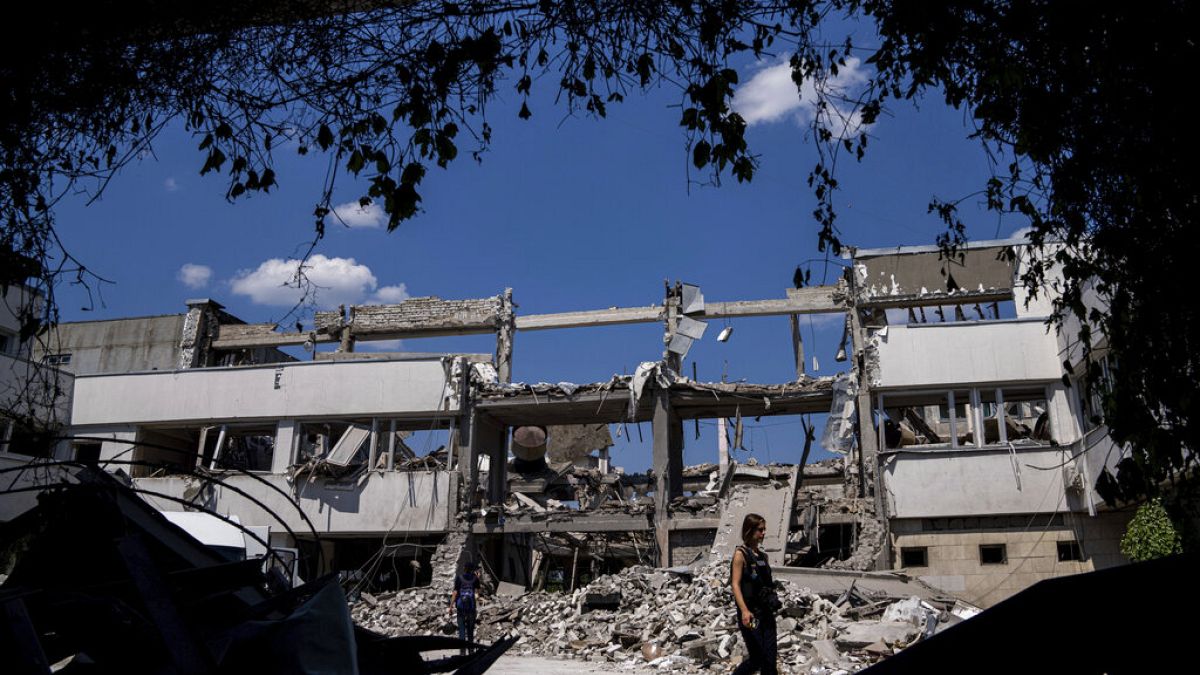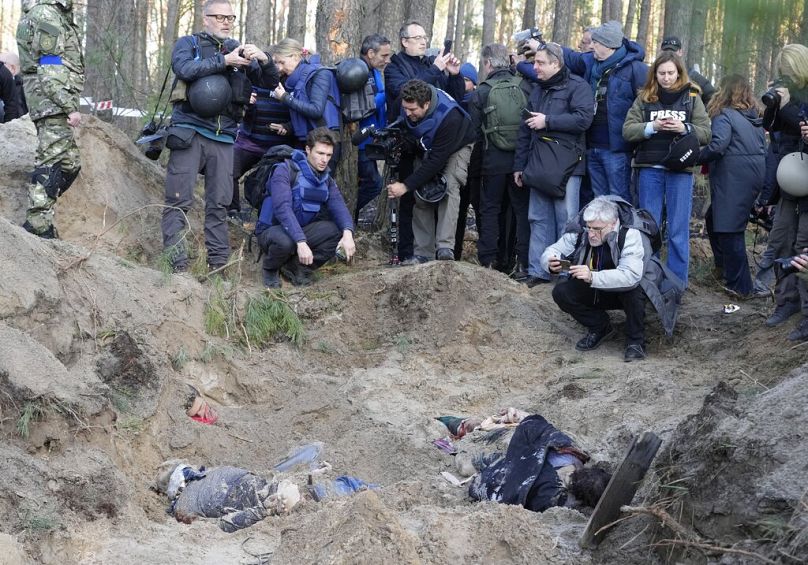“We don't really have a choice of burning out or not,” Ukrainian journalist Alya Shandra told Euronews. “If we burn out and who's left?"
In the early hours of the morning on 24 February, Natalie Vikhrov opened her laptop with bleary eyes to catch the tail end of Putin’s speech.
Minutes later she heard the distant thud of explosions.
“That whole night was a little tense, you could feel something was going to happen,” she said.
Vikhrov is one of hundreds of Ukrainian journalists, braving bombs and bullets to report on the war tearing their country apart.
Writing freelance, she focuses on human rights and marginalised groups, particularly Ukraine’s LGBT community, and has tried to gather stories from people living on the edge of the frontline.
“At times it's been very emotional,” Vikhrov told Euronews. “You get used to the shelling and what not, but not personal stories”.
“There are some moments that really hit you.”
Vikhrov recalls speaking to one mother whose son had just called her to apologise for anything he had ever done wrong in his life after joining the army, knowing that he might die, or watching families say goodbye at the border, possibly never to see each other again.
“Every time somebody is comfortable enough, and willing, to share their story, it's a life-shaping experience.”
“I am always so thankful that that person is willing to trust me."
‘You see a different side to people’
Spending the first eight years of her life in Kharkiv, Vikhrov was raised in Australia but decided to return to her native Ukraine in 2016, amid the fighting sparked by Russia's illegal annexation of Crimea two years before.
Since the outbreak of all-out war this year, she has seen a different side of her people.
“There’s been a lot of unity. It is touching to see. People have really got together and helped each other out.”
“The war has broken down so many barriers”.
Still, Vikhrov said there were so many issues that were “slipping under the radar” in Ukraine.
“Already before the war, it was difficult for some marginalised voices to be heard. Now they are getting very next to no attention."
Women have been on the front lines since the very start of modern war reporting, making an integral contribution to our understanding of conflict around the world.
In what was called the "scoop of the century", English reporter Clare Hollingworth trumped her male contemporaries by uncovering the "1000 tanks massed on the Polish border" in 1939.
Her report, which came on the eve of World War II, even alerted the British government of Germany's intentions.
But their road to success has been far from easy.
Even after trailblazers like Hollingworth smashed down the barriers of the old boys club, female reporters today still face sexism and sexual violence, making an already difficult and dangerous job doubly so for women.
Out of 112 countries polled by Reporters Without Border, 40 were identified as dangerous or very dangerous for women journalists due to the risk of sexist and sexual violence.
At least 12 journalists were killed in Ukraine last year, two of whom were women, according to the International Federation of Journalists.
‘War became our reality’
Alya Shandra, editor-in-chief of Euromaidan Press, says she “scarily” grew accustomed to war.
Reporting on the grim aftermath of Russia’s occupation in Bucha and Izium, “we got used to expecting mass graves and torture chambers in liberated areas,” Shandra told Euronews.
“Now war and loss is all around us,” she said. “It is surprising how easily we have adapted to our new horror”.
“It is troubling that the world is adapting too and seeing the war as something normal.”
“What we report on is generating less and less interest because the war has become something usual, something normal.”
Shandra has been reporting on the bloodshed in her country since 2014 -- the year Russia invaded and illegally occupied the Crimean peninsula and instigated two so-called "people's republics" in the Donbas to attempt to secede.
Every day she and Euromaidan’s team of journalists try to report on the “dysfunction” that Russia causes. However, Shandra insisted that “everybody in Ukraine today is part of the war effort.”
“Starting in 2014, we were very much aware of how important it was to be a journalist. We were studying and debunking Russian propaganda, just conveying the truth to the world."
“All Russia does is drench our country and the whole world with a big bunch of lies,” she explained.
“Ukrainian journalists dream of living in a peaceful country and would dream of reporting the ups and downs of democracy”.
“We dream of the time that this will come.”
‘Such loss, such suffering’
Yet even doing the basics of her job is a challenge.
Journalists, wherever they are, need stable internet and power supply to work.
But Shandra said her job was being made especially hard by sporadic outages caused by Russian strikes.
Since October, Russia has targeted critical infrastructure across Ukraine, knocking out power and water supplies for painstaking stretches of time.
“Despite all of this, we try to keep working as usual,” says Shandra. “Everyone in their own fields keeps working to help our army win.”
Another issue is that journalists are currently banned from visiting the front line.
For Shandra, this “information blackout”, though frustrating, was understandable because of the need to protect sensitive information, like Ukraine’s military objectives.
Others have criticised Ukraine’s decision to tighten controls over the press.
New draft legislation under discussion could make all media outlets answerable to a single state body that would have the power to warn, fine or shut them down.
Until now, Ukraine has not officially censored any reporting, relying largely on self-censorship by journalists.
‘If we burn out, who is left?’
Shandra was torn personally.
Her family was split in two by the war, and she does not see her daughter and husband.
Four other female journalists Shandra knows left the country to take their children out of danger.
“I was out of the country for four months at the beginning of the war with the kids,” she said. “But it was very difficult to be away.”
“I wanted to go back”.
Conflict is horrific for all those involved, but as a reporter, immersion in the violence and bloodshed is high. Many burn out or are left on edge with nerves fraught.
“We don't really have a choice of burning out or not burning out,” Shandra said. “If we burn out and who's left?
“There are very many choices that people have in their lives, which we do not have right now. The only thing that matters now is winning the war.”
“That eclipses everything,” she added.
Shandra described how her Facebook feed is now one necro-log, littered with the names and faces of people she knew who had been killed in the fighting.
“Everyone in this country is still living through 24 February. It has become one giant, enormous date stretched over these eight months."
“It's when our lives changed for all of us in the country. Just imagine all your life, everything that you were planning for, everything you depended on, was just abandoned.”
Still, Shandra said the war had made her immensely proud of Ukraine and her people.
“I respect my own country a lot more now. We are doing wonders, striking together. We are kicking the ass of the so-called 'second most powerful army in the world.'”

